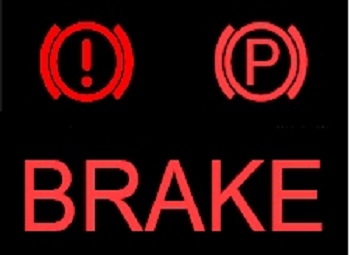Car brake noise issues rank among the top complaints from motorists. The connection between stopping efficiently and hearing an unusual noise while braking becomes a valid concern. Automotive braking systems, without a doubt, remain the most important safety feature on any given automobile.
For this reason car makers build their systems with redundant backups and warning devices. In addition, manufacturers notify the driver if a problem exists. Here we’re going to talk about these warnings and then provide an explanation about how car brake noise can often tell you what’s wrong by the type of sound generated.
Automotive Brake System Warning Signs
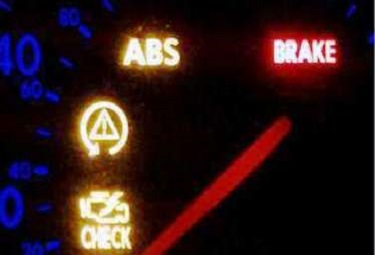
The type of brake warning devices your automobile rolls off the assembly line with depends on the year, make and model. With that said, automobiles built within the last 20 years have a few standard warnings found across all makes and models. These cars include a red brake light warning system.
ABS warning lights use an Amber lamp to notify drivers. Generally speaking the different colored lights speak volumes about the seriousness of the problem. Red means stop driving and get the vehicle towed for diagnosis. A red brake light could indicate a serious hydraulic problem, low brake fluid or you’re driving around with the emergency brake applied. However, the amber ABS light represents a proceed with caution situation.
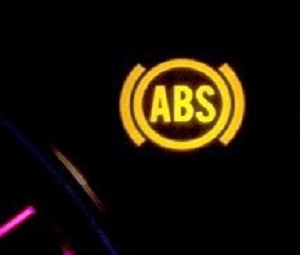
When the ABS notification lamp illuminates the anti-lock brake system may not function as per design intent. Despite the ABS system using an amber colored bulb, these problems still require immediate attention. Vehicles in a panic stop situation with an ABS warning light illuminated could respond in a way the driver isn’t used to.
In addition to the warning lights, brake systems also provide other telltale signs that problems exist. Unusual car brake noise becomes one of these warning symptoms, that doesn’t turn on a warning lamp, yet indicates a problem exists. The way the brake pedal feels when you push on it can also indicate issues. A Pedal that travels more than halfway, before the car begins to stop, warrants an investigation or a complete brake system inspection.
Different kinds of Car Brake Noise
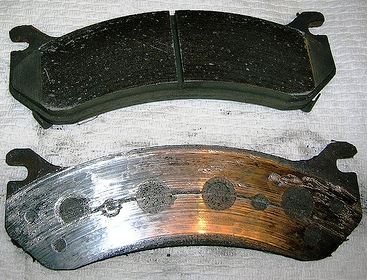
Car brake noise represents a method of communication. The different sound an automobile generates when it has a brake system problem is almost like a foreign language. Fortunately, experienced mechanics understand this unique communication method. With that said, do-it-yourself brake mechanics and drivers can learn this language a lot easier than French or Spanish.
First let’s talk about the different sounds an ailing brake system can make and then we’ll talk about what those sounds represent. Of course, the most popular sound generated by brake systems remains a squealing while stopping. Finishing in second place, in the car brake noise department, becomes the dreaded grinding noise. Although these two sounds represent the most common, brake systems also produce annoying clicking sounds and in some cases rattle noises over bumps.
Deciphering Car Brake Noises
Since drivers complain about brake squeal more often than any other condition we’ll tackle this first. A quick definition of a brake squeal represents a high pitch sound easily heard inside the passenger compartment while driving. This high pitch noise is commonly generated from a high-speed vibration of the brake pads.
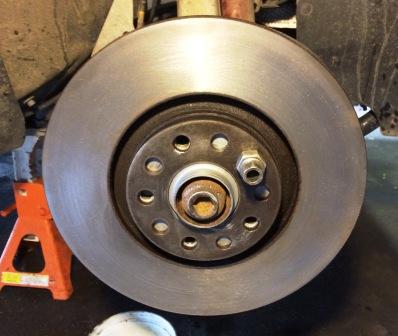
Vehicle manufacturers deploy several devices to reduce this vibration to dampen the noise. They often install brake pad shims on the backing plate of the disc brake pad where it contacts the caliper piston. They designed the shims to absorb vibrations. In addition manufacturers use stainless steel spring clips to firmly hold the brake pads in place. Both of these devices work together to reduce brake squeal.
If one or both of them malfunction the brakes can get very noisy. Automotive brake systems generate a lot of heat and take a beating as they ride through harsh environmental conditions. Since the engine rides up front, problems with front brakes are more common. Brake pad shims can fall off and the stainless steel spring clips can rust or stretch and lose their ability to firmly hold the pad.
Another source of a squealing noise from a brake system comes from the metal tab mounted to the pads backing plate designed to notify the driver the friction material is worn out. Interestingly enough, this tab rubs against the face of the rotor and the noise disappears when the driver applies the brakes. In the end, pulling the wheels and performing an inspection remains the fastest way to uncover the root cause of car brake noise and squealing problems.
The Brakes make a Grinding Sound
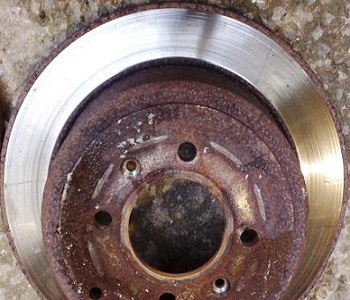
When it comes to a grinding noise from the wheel area the brakes only represent one of the possibilities. If the grinding happens all the time, including when the car coasts down a hill, this could actually point to a wheel bearing issue. However, if the grinding noise increases when applying the brakes this sends the mechanic in the direction of a brake system problem.
The most common issue identified by mechanics when a loud grinding occurs while applying the brakes points to completely worn out brake pads. The friction material mounts to a thick steel plate. When the friction material wears off completely you get a metal to metal situation. This unmistakable car brake noise requires immediate diagnosis. Unfortunately, when drivers hear this type of grinding sound it’s usually an indication that the disc brake rotors will also require replacement during service.
Driving around with Noisy Brakes

Some motorists become accustomed to driving around with certain problems. Many of these drivers ignore a check engine light or unusual sounds that develop slowly. When it comes to car brake noise waiting to diagnose the issue can increase the cost of required services.
In addition to increased costs, you can also experience increased stopping distances. Car owners know how long it takes the car to stop and use this knowledge in panic stopping situations. However, when an automobile experiences a problem in this safety system the car or truck doesn’t respond as the driver expects. In other words, if you want to hold down repair costs and retain the safety designed into the vehicle have a professional mechanic perform a thorough brake inspection on a regular basis.

